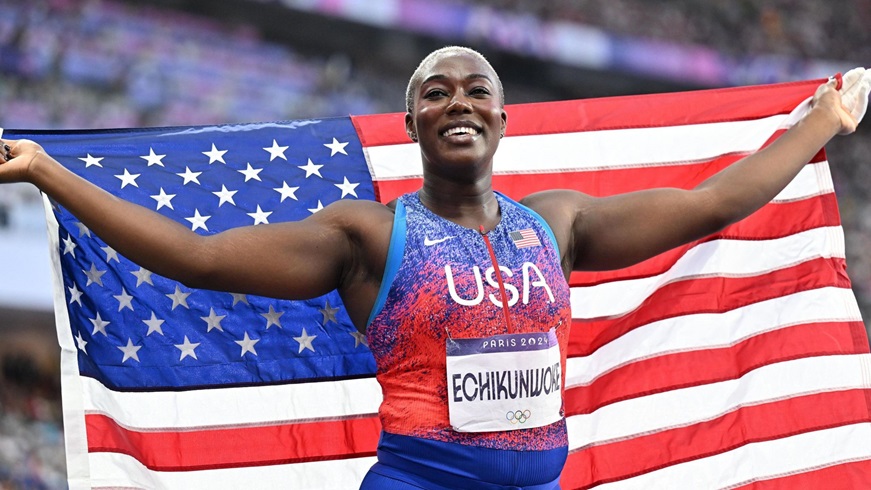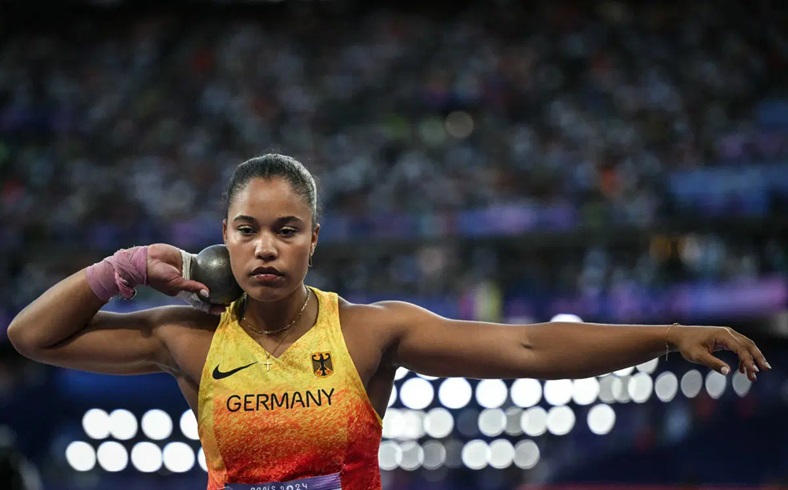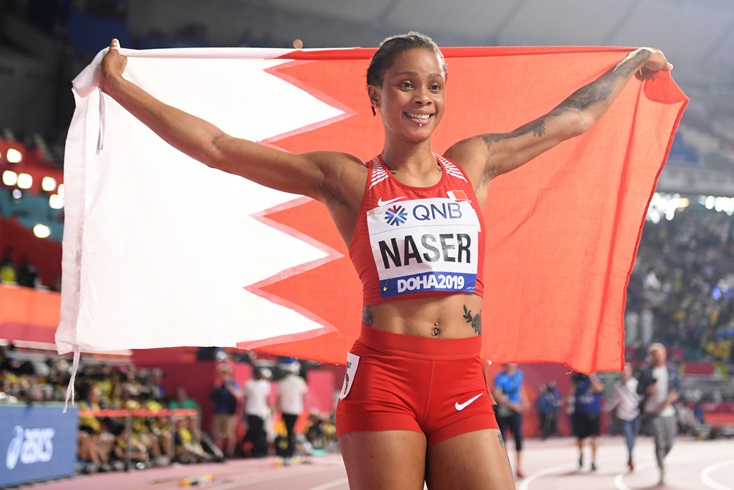August 12, (THEWILL) – The Paris 2024 Olympics revealed contrasting narratives within the world of athletics, particularly highlighting the success of “Nigerian” athletes competing under different flags and the struggles of Team Nigeria. These stories underscore themes of personal triumph, complex identities, and the challenges faced by a nation striving to compete on the global stage.
Annette Echikunwoke, born in the United States to Nigerian parents, represents one of these narratives. Initially, she aspired to bring glory to Nigeria, especially after showing great promise in the hammer throw. However, her hopes were shattered at the Tokyo 2020 Olympics due to a last-minute disqualification over the failure of the Athletics Federation of Nigeria to complete mandatory doping tests for her athletes.
The disqualification, seen by many as controversial, left Echikunwoke deeply disillusioned. Her decision to switch allegiance to the United States was driven by a desire to regain control over her athletic career. In Paris, she competed with renewed determination, and her performance culminated in a silver medal in the hammer throw. For Echikunwoke, the success was more than just a medal—it was a validation of her talent and a reclamation of her career that had once been in jeopardy.
Yemisi Ogunleye’s journey is another example of the complex interplay between national identity and personal ambition. Born in Germany to Nigerian parents, Ogunleye’s athletic development was deeply influenced by the German sports system, which provided her with the resources and opportunities to thrive. Despite her strong connection to Nigeria, she chose to represent Germany, a decision that was practical rather than ideological. Her choice paid off in Paris, where she delivered a gold-medal-winning performance in the women’s shot put. This victory was a testament to her hard work and the support she received in Germany, contrasting with the challenges she might have faced had she competed for Nigeria.
Salwa Eid Naser, born Ebelechukwu Agbapuonwu in Nigeria, presents perhaps the most intricate story of the three. After moving to Bahrain as a teenager, she was granted citizenship, changed her name and quickly rose to prominence in the athletics world. At the Paris 2024 Olympics, she added an Olympic silver medal in the 400 metres to her list of achievements. Eid Naser’s decision to switch nationalities was driven by the enhanced support and facilities available in Bahrain. This choice, while controversial to some, highlighted the importance of adequate resources in nurturing athletic talent. Despite criticism from those who felt she abandoned her Nigerian roots, Eid Naser’s achievements for Bahrain solidified her status as a top athlete on the world stage.
While these athletes found success under different flags, Team Nigeria’s performance in Paris was marked by a series of disappointments. Tobi Amusan, the world record holder in the women’s 100m hurdles, entered the Olympics with high expectations. However, she failed to qualify for the final, finishing third in her heat with a time of 12.55 seconds. Her exit was a significant blow to Nigeria’s medal hopes, especially given her record-breaking performances in the past.
Ese Brume, another of Nigeria’s top athletes, also fell short of expectations in the women’s long jump. Despite being a strong contender for a medal, she finished fifth in the final with a jump of 6.70 metres. Brume’s performance was seen as a disappointment, considering her previous successes on the international stage.
The men’s 4x400m relay team, comprising Emmanuel Ojeli, Ezekiel Nathanial, Dubem Amene, and Chidi Okezie, faced a different kind of setback. The team initially finished second in their heat, a result that should have secured them a place in the final. However, they were disqualified due to a lane infringement, a ruling that dashed Nigeria’s hopes for a medal in the event.
In wrestling, Esther Omolayo Kolawole’s campaign in the women’s 62kg category ended in disappointment as she lost 5-1 to Kyrgyzstan’s Aisuluu Tynybekova. Similarly, Ashton Adeyemi Mutuwa faced a tough challenge in the men’s 125kg freestyle wrestling event, where he suffered an 11-0 defeat to Hungary’s Daniel Ligeti. Both wrestlers had entered the Olympics with hopes of reaching the podium but found themselves outmatched by their opponents.
Elizabeth Oluchi Anyanacho, competing in the women’s -67kg taekwondo, also faced an early exit after losing her second-round fight 2-0 to China’s Jie Song. Her defeat added to Nigeria’s mounting list of disappointments at the Games. The Super Falcons, Nigeria’s women’s football team, had a particularly difficult tournament. Despite their reputation and history of strong performances, the team failed to progress past the group stages, losing all three of their matches.
In the men’s 400 metres, Samuel Ogazi represented a glimmer of hope for Team Nigeria. Reaching the final was a commendable achievement, but Ogazi ultimately finished seventh, falling short of the medal positions. His performance, while respectable, highlighted the gap between Nigeria and the leading nations in athletics.
Ese Ukpeseraye, who made history as the only African cyclist among the 30 competitors in her event, also found the going tough. Despite her best efforts, she did not win a medal, but her participation marked a significant moment for Nigerian cycling on the global stage.
The contrasting fortunes of these athletes—those who excelled for other nations and those who struggled for Nigeria—underscore the challenges facing Nigerian sports. The Paris 2024 Olympics highlighted systemic issues within Nigeria’s sports administration, particularly the lack of investment in training facilities, coaching, and athlete welfare. The success of athletes like Annette Echikunwoke, Yemisi Ogunleye, and Salwa Eid Naser under different flags serves as a stark reminder of what is possible when athletes are provided with the necessary support to thrive.
For Nigeria, the lessons from Paris 2024 should serve as a catalyst for much-needed reforms in the country’s sports infrastructure. By addressing these systemic issues, Nigeria can ensure that its athletes have the opportunity to achieve their full potential and bring glory to the nation on the world stage. The stories of Echikunwoke, Ogunleye, and Naser highlight both the opportunities and the challenges faced by Nigerian athletes, and they underscore the importance of creating an environment in which talent can flourish without the need to seek opportunities elsewhere.
As Nigeria reflects on its Olympic performance, which is must do, it is crucial to consider the broader implications of these narratives. The success of Nigerian-born athletes for other nations should not only be a source of national pride but also a wake-up call for the country to invest in its sporting future. Only by doing so can Nigeria hope to retain its top talents and ensure that future generations of athletes achieve their dreams while proudly representing the green and white.
Jude Obafemi is a versatile senior Correspondent at THEWILL Newspapers, excelling in sourcing, researching, and delivering sports news stories for both print and digital publications.






